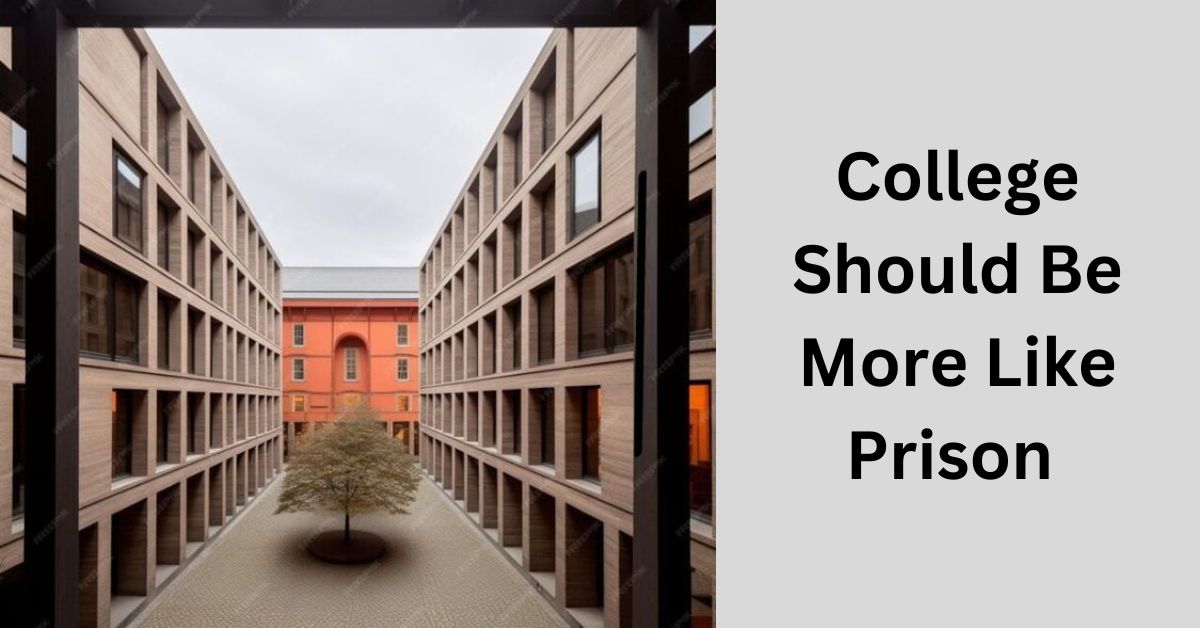
College Should Be More Like Prison – The Detailed Information!
This unconventional perspective prompts a rethinking of structured learning, drawing parallels between prison organization and potential benefits in colleges.
Join us on this thought-provoking journey to uncover opportunities for trust, excitement, and personal development through disciplined education.
This article delves into the uncharted territory of this idea, highlighting its potential merits and transformative impact.
Table of Contents:
The Need for Structure – Here To Know!
Advocates for making college more structured, drawing inspiration from the regimented schedules in prison, argue for the benefits of order and discipline. In prisons, strict enforcement of daily routines allows inmates to focus on personal development without interruptions.

1. Establishing a Timetable:
Incarcerated individuals adhere to a meticulously structured daily routine within the prison system, with strict enforcement of meal times, exercise periods, and work schedules.
This controlled environment allows for focused personal development and healing without disruptions. Similarly, a more structured routine emphasizing time management and productivity could benefit college students.
2. Academic Responsibility:
Incarceration requires individuals to be answerable for their actions, a concept transferable to the university setting. Educators can enhance classroom efficiency by enforcing stricter attendance policies.
This heightened sense of accountability could instill a more severe mindset among students in the academic environment.
Self-Reflection And Personal Growth – Go In-Depth!
Self-reflection and personal growth are integral components of adopting a structured approach in college, drawing inspiration from the notion that “college should be more like a prison.”

This concept promotes a disciplined and accountable environment, fostering individual development and maturity.
1. Accountability for Actions:
In a prison-like college setting, students are held accountable for their actions, much like inmates in a correctional facility. This accountability cultivates a heightened sense of responsibility, encouraging students to reflect on their choices and behavior.
2. Established Schedule:
Emulating the regimented daily schedule found in prisons, a structured routine in college allows students to allocate time purposefully. This routine promotes self-discipline and time management, enabling individuals to reflect on their priorities and goals.
3. Focus on Personal Development:
Just as prisoners have the opportunity to focus on personal development within the confines of a structured environment, college students in a similar setting can immerse themselves in academic and personal growth without the distractions of a chaotic lifestyle.
4. Promoting Thought with Tighter Regulations:
Stricter attendance regulations and prompt submission of assignments create an environment where students must reflect on their academic commitment. This reflection can lead to a deeper understanding of personal strengths and areas for improvement.

5. Building Resilience:
The structured nature of a prison-like college setting challenges students to adapt to a disciplined routine, fostering resilience and adaptability. These qualities are essential for personal growth and success in both academic and professional spheres.
6. Developing a Serious Mindset:
Adopting a more structured approach in college instills a severe mindset among students. This mindset emphasizes the importance of education, personal responsibility, and the pursuit of excellence, contributing to long-term personal and professional growth.
Read Also: The Basics of Business Planning – Unlocking Success!
Discipline And Being Responsible – Let’s Read!
This concept examines how it instills discipline and prepares students for challenges in academia and beyond.

1. Following the Rules Strictly:
Just like prisoners must follow strict rules, having clear directions in a university can make students more responsible and civil. This includes being honest in academics, following college rules, and sticking to ethical standards.
2. Facing the consequences for Misbehavior:
When inmates misbehave in jail, they face severe punishments like being separated from others or losing privileges. Similarly, universities may give penalties to students who repeatedly break the rules. This helps promote a sense of responsibility and the importance of following the rules.
Read Also: Business Ideas – Unleashing Simple and Smart Business Ideas!
A Supportive Environment – The Ultimate Guide!
1. Ensuring Safety on Campus:
In prisons, keeping inmates safe is crucial. Similarly, it’s vital for college students to feel safe and secure on campus. Improved security measures and support services create a safe learning and living environment.
2. Support through Mentorship:
In prisons, ensuring the security of inmates is vital. Likewise, a secure campus is crucial for college students’ well-being. Enhanced security measures and supportive services make people feel safe and secure.
Transformative Experiences within Confines – Gain Your Knowledge!
Embarking on exploring the transformative experiences within the confines of a concept proposing “college should be more like a prison” opens a gateway to unconventional perspectives on personal and academic growth.

This paradigm shift suggests that embracing certain aspects of a structured and disciplined prison-like environment in a college setting could lead to profound transformations.
In this exploration, we delve into the notion that confines, when purposefully constructed, have the potential to shape individuals into resilient, self-reliant leaders, fostering an environment conducive to unparalleled personal and academic development.
Read Also: Vanessa West Tripod – Join Our Advocacy Efforts!
Elevating Personal Responsibility – Here You Know!
In a college environment modeled after the structure of a prison, there exists a unique cultivation of personal responsibility, where it is not merely encouraged but deemed essential.
This framework holds Students accountable for their academic pursuits, actions, and personal development.
This heightened sense of responsibility serves as a transformative force, fostering a mindset that transcends the confines of college life, equipping individuals with the skills and maturity needed to successfully navigate the challenges of adulthood.
As students navigate this structured educational environment, the emphasis on personal accountability becomes a cornerstone for long-term growth, instilling values that extend far beyond their academic tenure and into the broader spectrum of their lives.
Frequently Asked Questions(FAQs):
1. Why propose that college should be more like prison?
Not to replicate negatives but to explore the benefits of a structured environment for personal and academic growth.
2. How can a prison-like structure promote personal responsibility in college?
Prioritizing accountability fosters a mindset for lifelong challenges, transcending college years and preparing individuals for continuous growth and success in various life aspects.
3. Does this concept limit creativity and individuality in college?
No, it aims to enhance productivity within defined boundaries, providing a foundation for success.
Conclusion:
At the end of this Article,
Intriguing exploration to unveil possibilities for building trust, finding excitement, and fostering personal growth within a structured educational experience.






